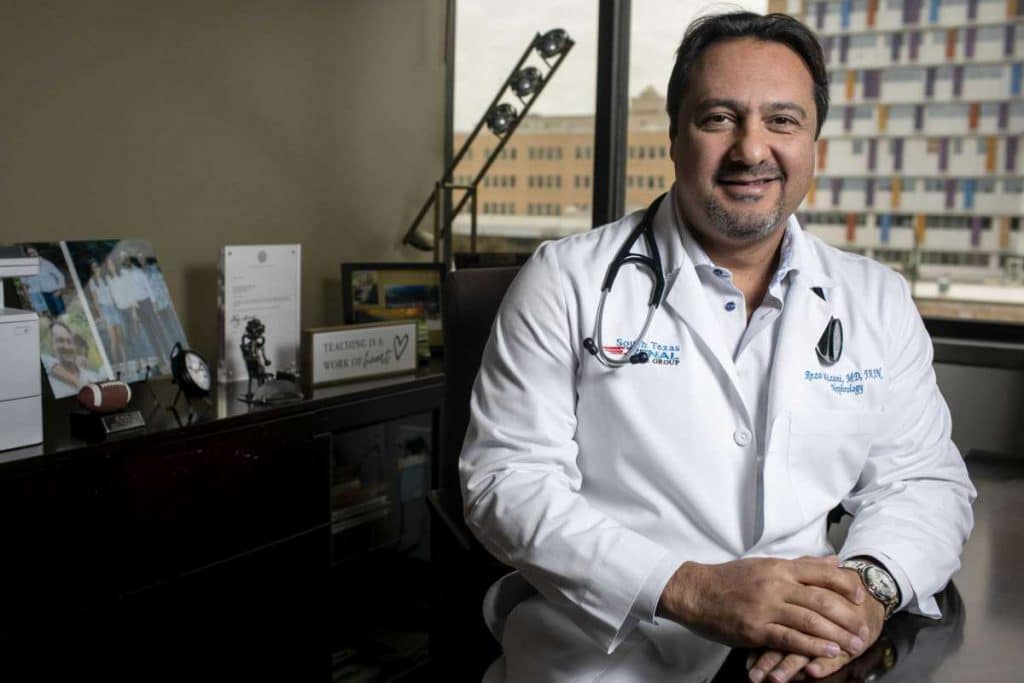
Dr. Reza Mizani, founder of the South Texas Renal Care Group, is on the front lines in the fight against diabetes in South Texas. He estimates that nearly 80 percent of the group’s patients are either diabetic or pre-diabetic.
With seven locations in San Antonio and five in towns such as Pleasanton and Eagle Pass, the group helps its patients manage diabetes, which can cause blindness or force amputation of limbs if left untreated. Mizani is also focused on halting what he refers to as the “generational effect” of the disorder. Diabetes patients often struggle to find work and housing, leading to poor educational and health outcomes for their children, which can result in them contracting it as well, he said.
“We’ve seen a generational worsening of diabetes,” he said. “When you see children who are 12 years old or 10 years old and they look 15, and they’re 200 percent of the weight they should be — they’re already destined for failure from a healthcare standpoint.”
Mizani is also founder of LASO Health, a recently launched healthcare app that seeks to connect patients with doctors, giving them easier access to procedures and tests such as MRIs and CT scans — and presenting them with clear prices, in contrast to the obscure billing practices that plague much of the U.S. healthcare system. The app, which covers only the San Antonio market, has five employees working from Geekdom, he said.
Iranian by birth, Mizani went to boarding school in the Dominican Republic before making his way to the U.S. Since he founded the renal care group in 2004, it has expanded to include 120 physicians and staff members.
He recently sat for an interview to discuss plans for his start-up and his thoughts on fighting diabetes and reforming the U.S. healthcare system. The following has been edited for brevity and clarity.
Q: How did you decide to go into nephrology?
A: When I was doing training, I realized that kidney disease is very sophisticated and beautiful in terms of physiology and things that happen in the human body. The kidney is often the forgotten organ. If you go out on the street and talk about breast cancer, colon cancer, cholesterol, heart disease, everybody will tell you something. But if you ask about the kidney, they pause and look at you like, “Oh, I don’t know.” Yet this is probably the most important organ in your body because if it fails it directly and very quickly affects other organs. And it’s silent. In other words, it does not give you a symptom until it’s very, very late.
Q: Diabetes is endemic to South Texas, right? Could you explain why that is?
A: One of the components is that genetically, the people that live in the southern belt of the United States and Northern Mexico perhaps have Native American genes that are very diabetogenic. They carry a very aggressive diabetes, mixed with our own diet and exercise habits. And the issue of excessive weight. It’s not one thing, it’s combination of them.
And with that comes the generational effect of chronic illnesses. Someone who is morbidly obese and has severe diabetes can’t really go out there and work. They develop kidney failure and now they have to do dialysis. Their kids (suffer because of) that — what sort of access to good nutrition they have, or education they have. All of that carries on.
Q: In the American healthcare system, is it possible to provide good care to underserved communities in a way that is affordable?
A: Yes. Yes, you can. I think the part that we always focus on is, “OK, do they have health insurance?” That is wrong. The focus should be a holistic perspective. It should be where you look at, OK, what is happening to the children of the people that have this chronic illness? What sort of opportunities are they getting? Are they going to school, is their weight under control, do they know what foods are good or bad? Because you have people that have the illness and it’s chronic and it is incurable. But can you block that in the future generation? That’s really my interest.
Q: Do you have hope that the cycle is being broken? Or is the problem getting worse?
A: We are not winning. I think we are identifying the problem right now. We think we have some solutions.
I think the complexity of the illness is such that it has to do with our diet. I’m not talking about you eating the wrong food, I’m talking about, “Where’s the food coming from? How much pesticide does it have? Is this food safe?”
Diabetes affects not only the kidney, it affects the eyes. The number one cause of blindness is diabetes. You can have amputation of the legs. If you’re a mom or dad and you cannot go out to work because you’re an amputee, what’s going to happen to your children?
Q: What changes could be made to the U.S. healthcare system to help underserved people access the care they need?
A: Number one is price transparency. Let’s say you buy a car, you take it home and the next morning they tell you, “Oh, that was a $50,000 car.” You’re shocked! That is what’s happening right now. You go to a hospital for whatever illness, you do not know when you walk out of that hospital what it cost you.
Number two, when we talk about access, everything else is accessible on your phone. You name it, you can get it on your phone, but you cannot get access to a doctor or to an imaging center from the palm of your hand. You have to call. Who do you call? Where do you begin? That is the other reason people don’t go to doctors on time. I worked for many years in (Baptist Medical Center) here in San Antonio. I was the chief of staff. You would see patients walk into the emergency room and it wasn’t because they didn’t have health insurance or a doctor. They’re coming in with preventable things. When you asked them why, some of them didn’t know how to access their benefits. They didn’t know how to find the doctor or make an appointment in a convenient, easy way.
Q: Have you found that Obamacare has helped underserved people in South Texas?
A: I think it has, to a certain degree. The problem with it is that the deductible of that insurance is so high. So theoretically you can say that these people are uninsured until they hit their deductible — because all of that is out of pocket, the initial part — and only for catastrophic illnesses, now they have an insurance. It’s good to have catastrophic insurance coverage — it wasn’t there before. But most people hang under that, in this zone of the deductible.
Q: Is a large portion of your patients on Medicaid?
A: No. Medicare? Yes. I can say that probably about 70 percent of our patients, easily, are on Medicare, because kidney disease has Medicare coverage. There was a law in the U.S. passed in the ‘70s, that if you have full kidney failure, and you’re on dialysis, you get Medicare, irrespective of age.
Q: Do you find that those patients are well-served by Medicare?
A: I think so. One of the greatest things with Medicare is that you don’t need a lot of pre-authorization to do testing. If you need to do a CAT scan, MRI, chest X-ray, you just do it. But even that has become very complex.
When new medication comes on the market that really makes an impact, it takes a long time for that to be approved by the insurance companies. Yet the patients could have had access to it years before so that their disease wouldn’t progress. And that’s not the story of my specialty — it’s the story of a lot of specialties.
Q: How many people are using your app?
A: We have probably about 5,000 downloads. Some of them are active patients, some are not.
It’s a start-up company. We have an office in Geekdom, we just recently moved there. You can browse on it, you can find the service that you like. Obviously, you have to pay for that service, because somebody has to pay that doctor or imaging center, and so on. We are looking to see how we can incorporate that with the insurance of the patient. It is a very complex world.
On the doctor side, I can tell you that for a lot of doctor practices, overhead has gone up so much that a lot of them are leaving and stopping practicing medicine many, many years before their retirement. There’s a lot of pressure on doctor practices to regulate us, in a sense of, “You have to submit this parameter, that parameter, this reporting, that reporting.” Well, all of that costs money, because you have to hire more people to do that. We cannot increase our prices — we earn a set fee of what they pay. That ceiling never changes, yet the costs of our operation keeps going up, up, up and it puts people out of business.
So we need to find a way to lower our expenses. And I think, take out the middleman and connect the patient and the provider together. The app does that.
Q: What is the next step? Are you planning a rollout, or —
A: We are in the stage of asking for all doctors that are interested to join us. We need to fill in other specialties that we don’t have right now.
The current healthcare is such that you make an appointment with Dr. X. You might have seen their picture on the website, read a few things. What we’re trying to do — it’s not done yet, but we’re going to do it — is that you actually get to meet Dr. X on the app. You see a video, how they talk. So the bedside sort of relationship begins from that moment. And you say, “No, I actually don’t understand what this doctor says,” or “he speaks in a voice that I don’t like.” Much like how when you want to go to an Airbnb, you look at the pictures. You get on the map.
That’s my goal — I’m not there yet, but that’s my goal. That’s where we’re going.
Article Courtesy of: MySanAntonio.com
